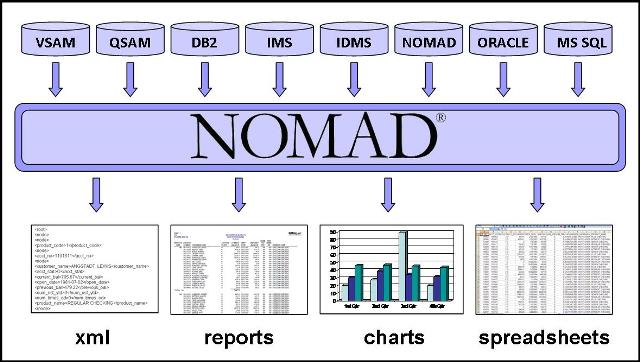

NOMAD is the most functionally rich business intelligence reporting tool available today for delivering a full range of applications with easy access to a variety of data sources for reporting and analysis. NOMAD is a fully relational product, which provides the basis for its tight integration with and highly efficient use of other relational database engines such as DB2 for z/OS and DB2 for z/VM.
The NOMAD database, which is both relational and hierarchical, has been used by our customers for years to provide an efficient repository of their data. Even though relational is the more common approach for a database today, a hierarchical approach may be more efficient for data storage and for reporting access based on the organization of your data. See the link directly below for complete list of the strengths and benefits of the NOMAD database
A variety of application generators and user interface options, including a reporting front end and a graphical user interface design tool, speed both the development and use of NOMAD applications.
NOMAD is available for z/OS and z/VM on mainframe machines.
In addition to the full-development version of NOMAD, we offer Reporter NOMAD and Run-Time NOMAD. Reporter NOMAD provides a cost-effective solution for read-only data access. Run-Time NOMAD provides an inexpensive and secure means of distributing your NOMAD applications developed with the full-development version.

In addition to data stored in NOMAD databases, you can easily access and combine data from a variety of sources, including leading relational systems such as DB2, as well as IDMS, IDMS/R, VSAM and QSAM files. With its special shared database facility, NOMAD users also have the ability to report from local or remote NOMAD databases on either z/VM or z/OS machines.
NOMAD is designed for maximized efficiency when accessing data in relational engines, including support for static SQL. NOMAD translates its commands into SQL statements and offloads as much work as possible, such as sorting and aggregation, to the SQL engine. Additionally, selective data listing can be performed efficiently through SELECT and LIST WHERE commands, and global data maintenance is handled by passing set calls for CHANGE and DELETE as a single transaction.
To find out more about how Select Business Solutions can help you either Contact Us, or visit our Product Resources area for all the latest related downloads.
